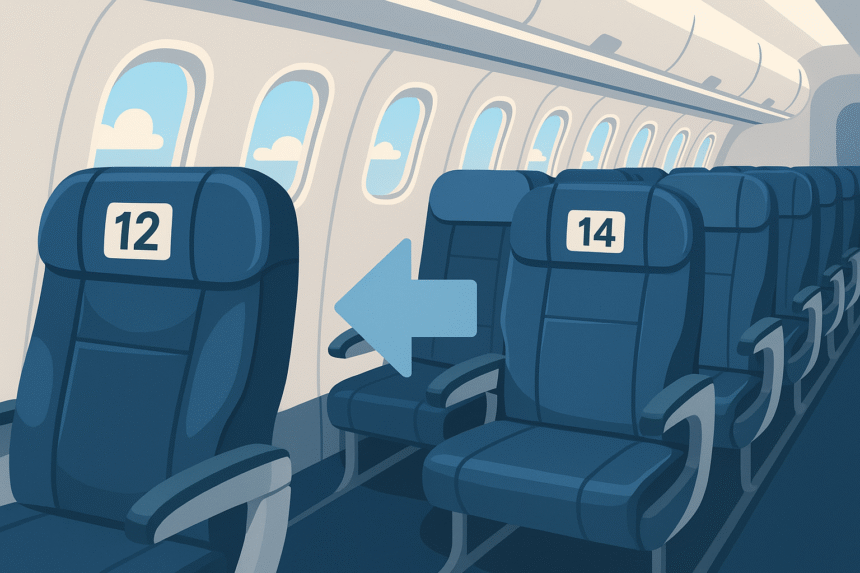Have you ever wondered why airplanes often skip the 13th row? It’s not aerodynamics or cabin layout that’s holding things back—it’s superstition. Welcome to the world of Triskaidekaphobia, the fear of the number 13. And yes, it’s so real that airlines around the globe have given it the power to rewrite seat maps.
What’s Behind the Missing Row 13?
Across cultures, the number 13 carries a heavy dose of bad luck. The roots go deep. In Christian lore, Judas was the 13th guest at the Last Supper. Norse myths tell of Loki crashing an all-god feast as the 13th god—and causing chaos. Add to that the Western preference for 12 as a symbol of completeness—and suddenly 13 sticks out like a curse.
So airlines do what cruise lines and skyscraper elevators do: they omit row 13. When you board, your seat reads 12… then 14. No seat, no fuss.
Not Just Planes—Buildings Do It Too
Yes, this trend isn’t exclusive to aircraft. Buildings commonly skip the 13th floor. Sometimes elevators jump from 12 to 14. Some hotels rename it as 12A. It’s not contractually necessary—it’s psychological. The idea is simple: if you don’t like superstitions, you won’t notice. If you do… well, you won’t get anxious mid-flight.
Airlines That Skip Row 13
Who’s in on this? Quite a few major players:
- Emirates
- Qatar Airways
- Air France
- Ryanair
- Lufthansa
These airlines deliberately leave out row 13 on many of their aircraft. They’re not alone—some even skip row 17, especially in places like Italy and Brazil. Why? Because 17 in Roman numerals can anagram to “VIXI,” which ominously translates to “I have lived”—a euphemism for “I’m dead.”
Who Keeps Row 13?
Some airlines don’t take this superstition seriously:
- American Airlines
- Delta
- Southwest
They keep row 13 intact. Some aircraft models, like certain Boeing 737 variants, even have row 13—simply because the seat layout had to accommodate extra legroom at exit rows or cabin design. But for most flights, missing row 13 is simply easier than explaining it.
Some Nerdy Reasoning Behind the Numbers
Not all skipped rows are due to superstitions. In some cabins, seat numbers are tweaked to maintain layout consistency—especially during retrofits or aircraft swaps. United Airlines has admitted to skipping row 14 on Polaris flights because, in some cultures, 14 sounds like “death” in Chinese. These moves cost almost nothing—but they help passengers feel more comfortable.
In other cases, airlines leave rows empty for operational reasons. On narrow jets, the last few rows might stay blocked unless the flight is nearly full. That helps with weight balance. But the usual suspect? Row 13 remains the classic: skipped for psyche, not structure.
A Glimpse into Triskaidekaphobia
The term Triskaidekaphobia was coined in 1911. It applies to anyone with intense anxiety or dread of the number 13. Only about 1–5% of people might have severe fear—but that’s enough to make airlines play along.
Instead of pushing back, they ease anxiety by removing the seat. It’s a simple gesture with a subtle effect—especially for nervous flyers.
Is It Rational or Just Tradition?
Let’s be honest: in a plane crash, rows are not predictive of luck. But we humans are not logic-first creatures. We cling to tradition and comfort. By skipping row 13, airlines aren’t ceding control—they’re showing empathy.
If skipping a number eases cravings for an aisle or window seat in row 14, who’s going to argue with peace of mind?
Quick Summary: Fast Facts on Row 13
| Fact | Detail |
|---|---|
| Fear of 13 | Called Triskaidekaphobia, rooted in history and superstition |
| Airlines that skip | Airbus and Boeing fleets from Emirates, Ryanair, Lufthansa |
| Other unlucky numbers | Row 17 in Italy & Brazil (because of “VIXI” anagram) |
| Airlines that don’t skip | American, Delta—believe logic over legend |
| Cabin design tweaks | Numbering changes sometimes for layout upgrades |
| It’s about comfort | Skipping row 13 aims to reduce passenger anxiety |
Final Boarding Call
Next time you board a flight and glance at your seat—and it reads “14”—don’t scramble for conspiracy theories. It’s just superstition taking a seat. A tiny change that said, “We get you.”
Row 13’s absence is less about bad luck and more about understanding fear—albeit irrational—and making the journey smoother. No magic. Just mindfulness.
Safe travels… and may your flight be full of logic, not luck.












